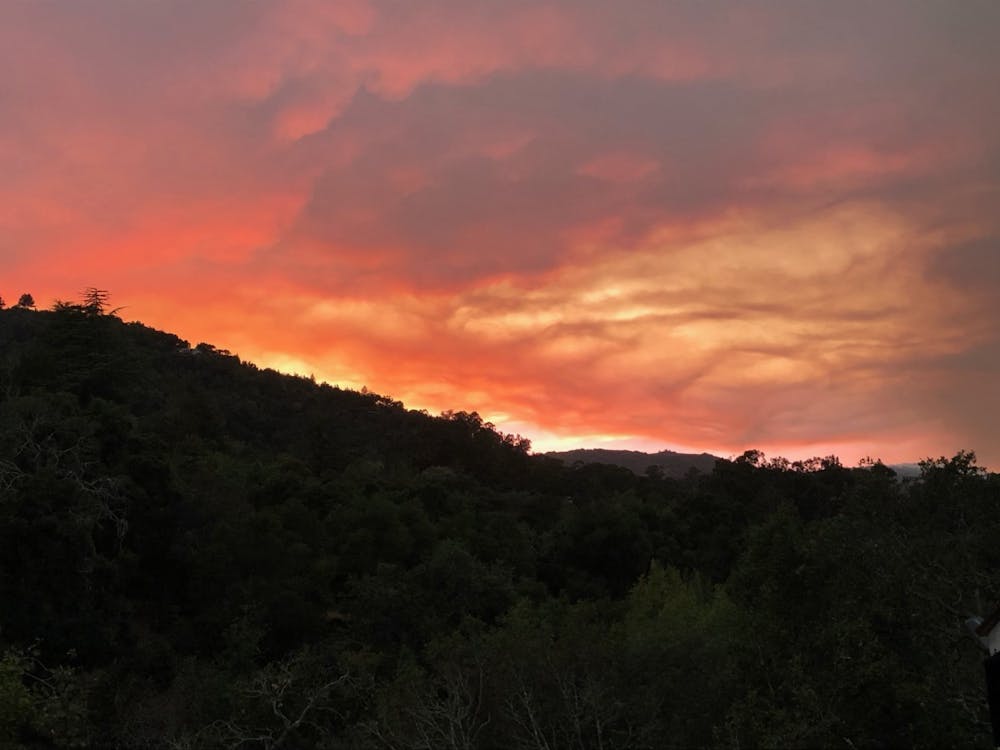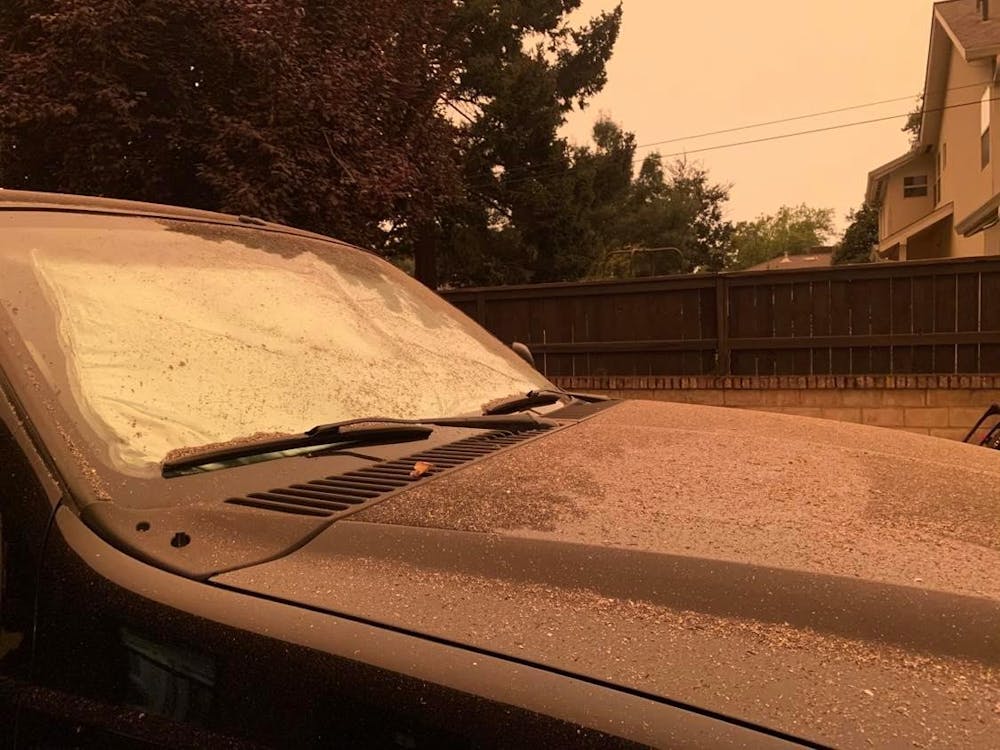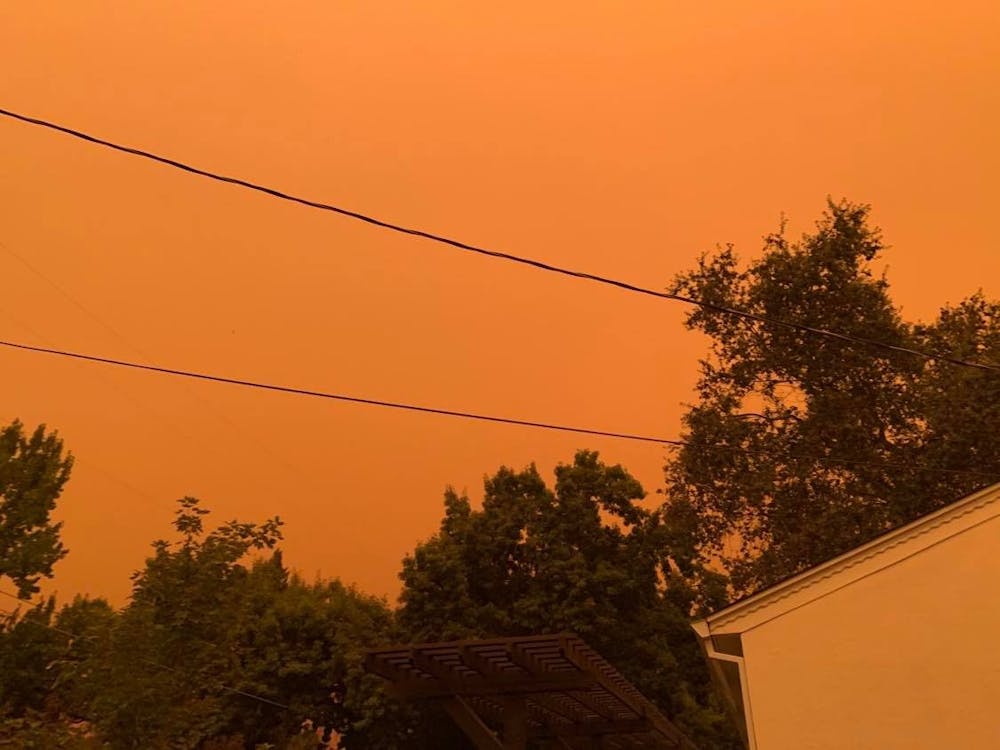When morning dawned Sept. 9 in Chico, Calif., the sky was dark and orange, and the street lights stayed on.
Junior Justin Dodds, who lives in Chico, remembers being able to stare directly at the sun—a small red sphere, smothered by smoke. Ash was everywhere, coating car hoods and camp chairs.
Strong winds had caused the North Complex wildfires, which began Aug. 18, to spread into Butte county, where Dodds lives. The air soon became so hazardous that Dodds and his family wore N95 masks when stepping outside.
“There were more people wearing masks because of smoke than because of COVID,” Dodds said, chuckling.
Drawn home by the pandemic, Dodds is one of many Duke students living on the West Coast who has grappled with worry and panic, smoke and ash, amid fires that have seared more than five million acres across California, Oregon and Washington.
Sophomore Aimi Wen, who is on a yearlong leave of absence, lives in Saratoga, Calif. She said the fires that threatened her home came from the C.Z.U. Lightning Complex.
Santa Clara County, where Wen lives, didn’t receive an evacuation order, but some surrounding counties did, she said. A neighbor had recently moved to the area from one of those counties, and her phone still had a different area code. When she received a notification to evacuate, she called Wen’s mother in a panic.
“We just took out the largest suitcases we had and threw random stuff in there, like our clothes. My mom made us dig in the pantry, and we brought out any food we could carry,” Wen said.

Smoke from the CZU Lightning Complex fire.
The family huddled with their suitcases, fearing their house could soon be incinerated. Wen said she remembers small, silly things, like her mother yelling at her younger brother Andrew to stop packing so many jackets and leave room for other stuff.
The city of Saratoga eventually notified them that no evacuation order was in place. After the scare, Wen’s mother loaded up on emergency supplies: rechargeable batteries, extra clothes, solar-powered flashlights that doubled as phone chargers.
Then there were days in September when San Francisco’s sky turned an eerie shade of orange. Smoke from those fires drifted toward Saratoga. Wen recalled going on a walk one morning and seeing ash fall from the sky.
“You don't realize how much white light we use in the house. And that sounds like a weird observation to make. But when you're standing outside and looking into houses, it looks ghostly because of how the lights are flickering,” she said.
Although this fire was farther away and less dangerous, it still took a toll.
“It felt very depressing. I think that was like the first time I understood why people in very seriously snowy places, like cloudy places, get depressed or have their moods shifted by the weather,” Wen said.

First-year Nick Richard-Craven lives in Pasadena, a suburb of Los Angeles, where he has been taking his Duke classes online. Although his family never had to evacuate, they still had to reckon with the hazardous air quality.
“It didn’t feel safe to go outside,” Richard-Craven said. “You could not see a mile ahead of you if you looked out the window because of how smoky it was.”
Meanwhile, Richard-Craven also had to keep up with his classes as usual.
“Being at home and doing online school, I’m already in the house a lot. The only way that I have been able to keep my sanity has been going outside, working out and hanging out with friends. For a week or two, I couldn’t go outside because of the air quality, which really affected my mental health,” Richard-Craven said.
In a normal year, the transition from high-school academics to college classes is already daunting. For Richard-Craven, the fires only made things more challenging.
“Not having the ability to go outside and relieve my stress has taken a toll on my ability to focus, and I’ve been struggling in my classes more than I usually would because of that,” he said.

Ash dusts a car in Chico, Calif., Sept. 9.
Like Richard-Craven, Dodds and his family were never forced to leave, though a town just 30 minutes south of them received an evacuation warning.
Now, in Chico, after a long, smoky nightmare, the skies have finally cleared.
“We have blue skies today. And yesterday. That's kind of like the first clear air we’ve had in a while,” Dodds said Sept. 25.
Get The Chronicle straight to your inbox
Signup for our weekly newsletter. Cancel at any time.

Chris Kuo is a Trinity senior and a staff reporter for The Chronicle's 118th volume. He was previously enterprise editor for Volume 117.

Madeleine Berger is a Trinity senior and an editor at large of The Chronicle's 119th volume.

